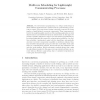Free Online Productivity Tools
i2Speak
i2Symbol
i2OCR
iTex2Img
iWeb2Print
iWeb2Shot
i2Type
iPdf2Split
iPdf2Merge
i2Bopomofo
i2Arabic
i2Style
i2Image
i2PDF
iLatex2Rtf
Sci2ools
125
click to vote
COORDINATION
2009
Springer
2009
Springer
Multicore Scheduling for Lightweight Communicating Processes
Process-oriented programming is a design methodology in which software applications are constructed from communicating concurrent processes. A process-oriented design is typically composed of a large number of small isolated concurrent components. These components allow for the scalable parallel execution of the resulting application on both shared-memory and distributed-memory architectures. In this paper we present a runtime designed to support process-oriented programming by providing lightweight processes and communication primitives. Our runtime scheduler, implemented using lock-free algorithms, automatically executes concurrent components in parallel on multicore systems. Runtime heuristics dynamically group processes into cache-affine work units based on communication patterns. Work units are then distributed via wait-free work-stealing. Initial performance analysis shows that, using the algorithms presented in this paper, process-oriented software can execute with an efficiency...
COORDINATION 2009 | Parallel Computing | Process-oriented Design | Process-oriented Programming | Process-oriented Software |
Related Content
| Added | 25 Nov 2009 |
| Updated | 25 Nov 2009 |
| Type | Conference |
| Year | 2009 |
| Where | COORDINATION |
| Authors | Carl G. Ritson, Adam T. Sampson, Fred R. M. Barnes |
Comments (0)

